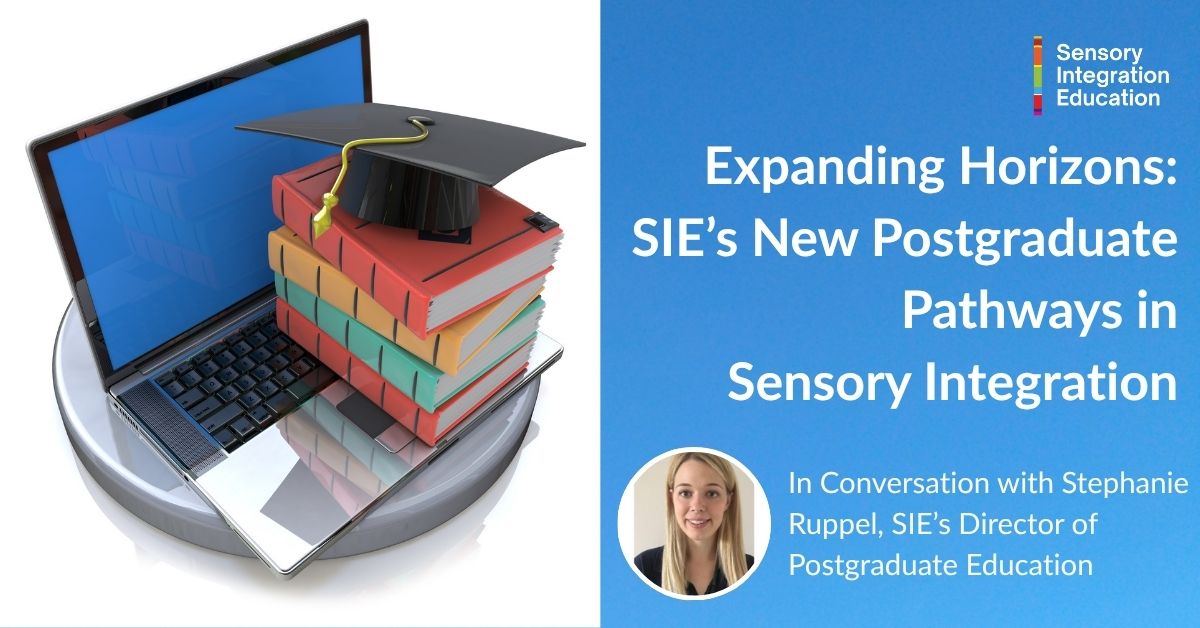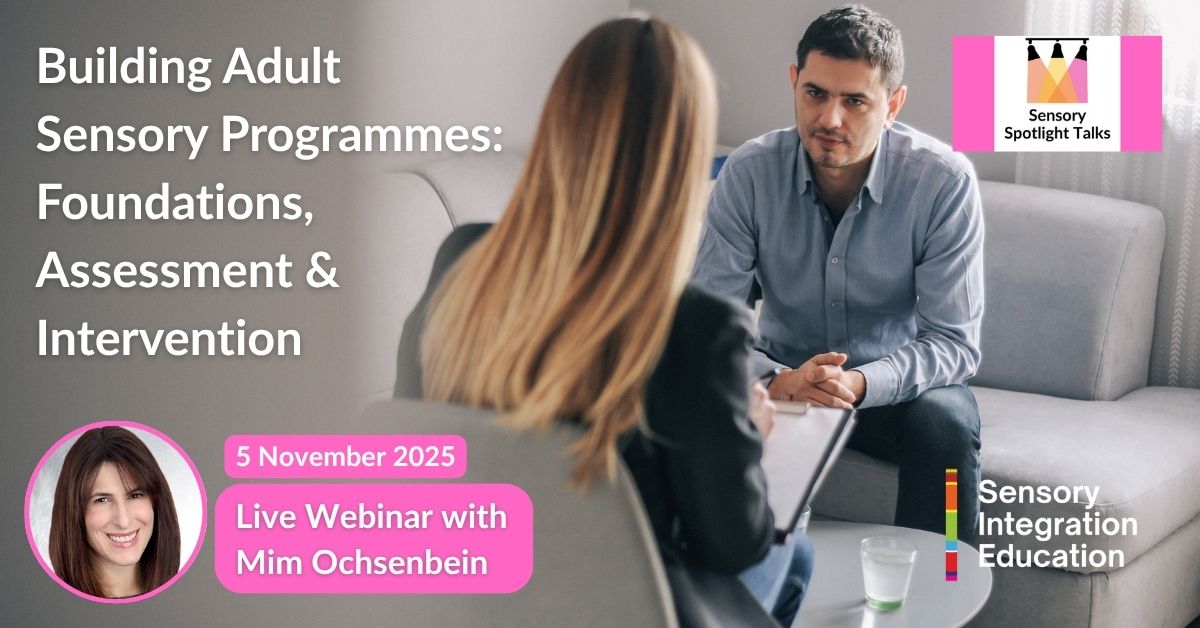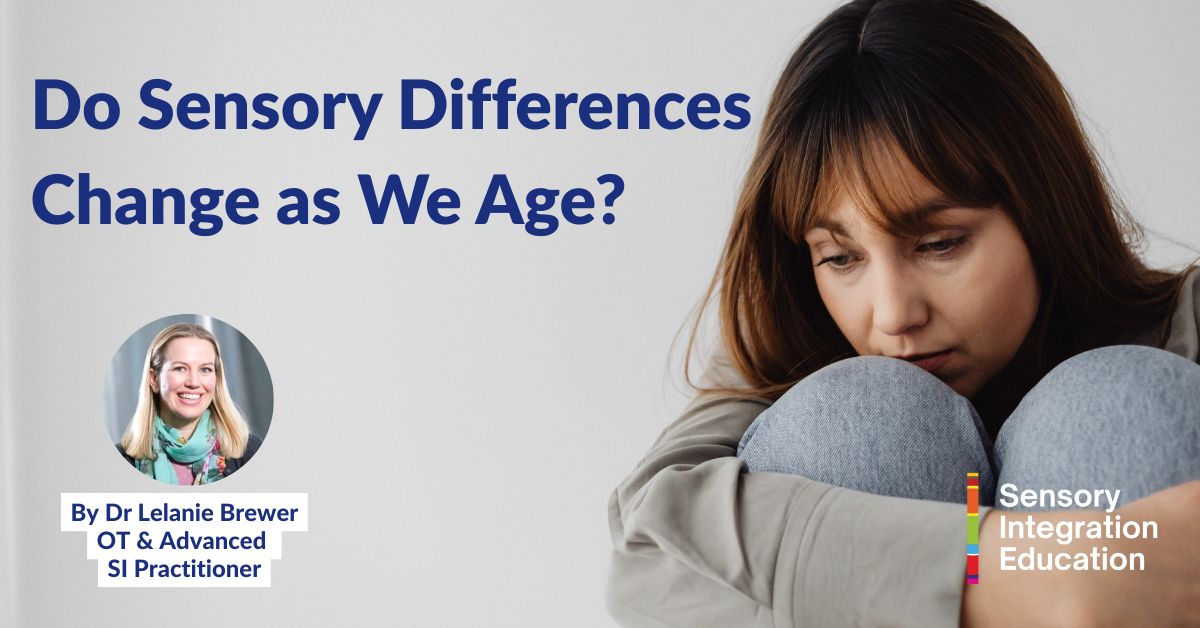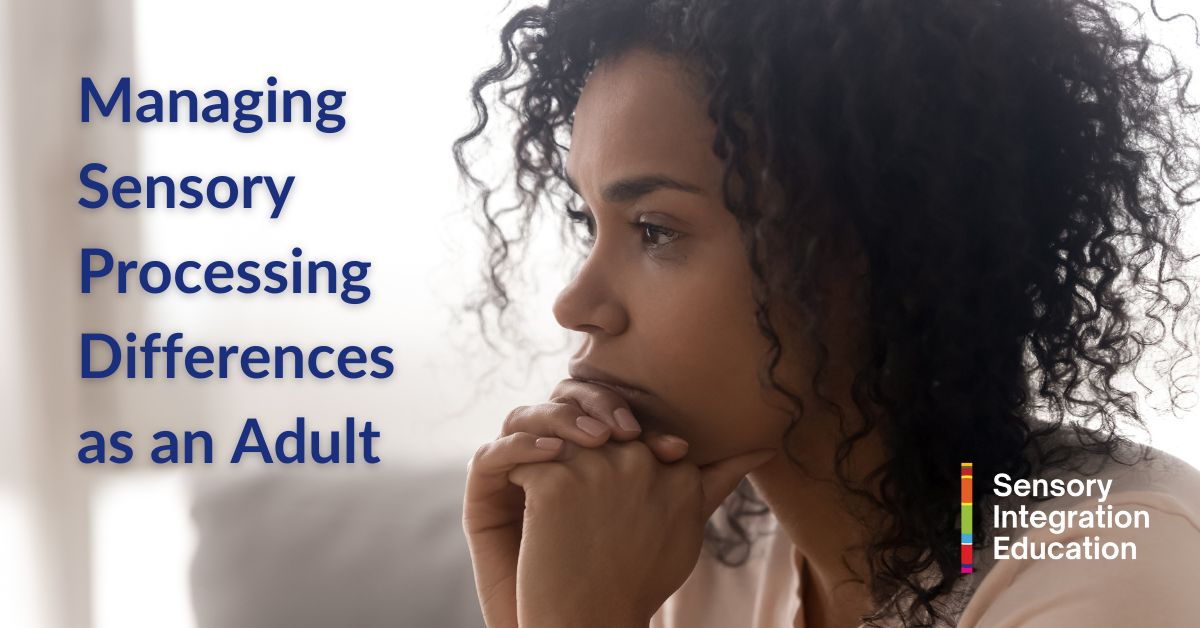EmphaSIze November 2025: Supporting Adults with Sensory Processing Differences
By Sensory Integration Education, 3rd November 2025
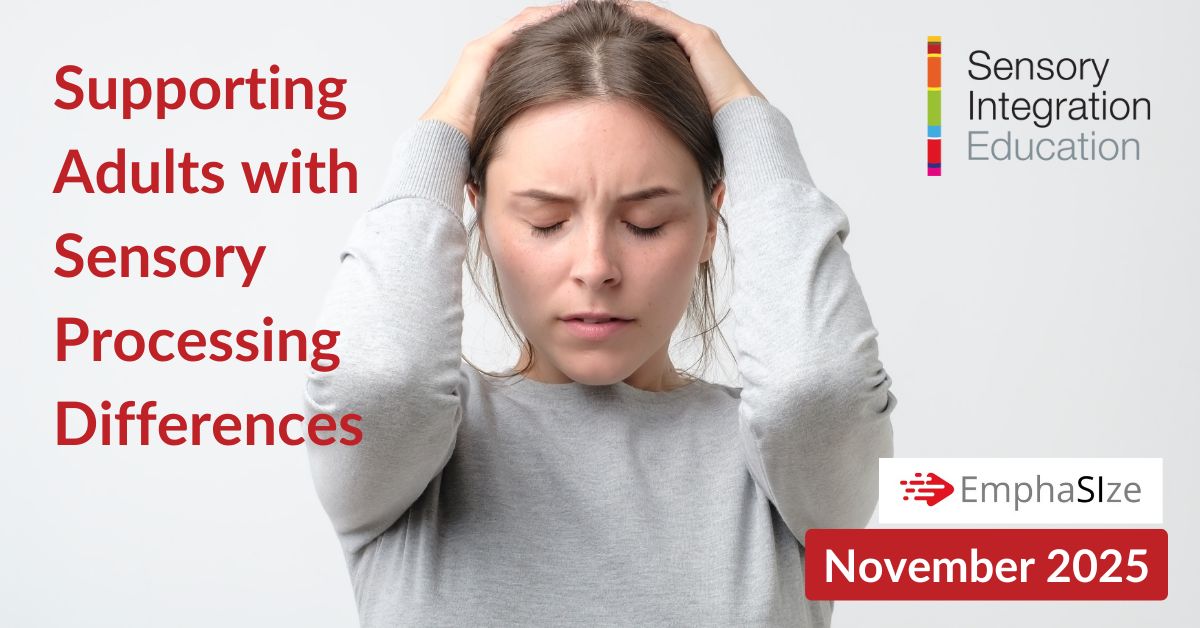
Welcome to the November issue of EmphaSIze! This month we're focusing on Supporting Adults with Sensory Differences.
Sensory processing differences are part of how we all experience and interpret the world around us. For some individuals, sensory information can feel too intense, not noticeable enough, or confusing to interpret. When these differences impact daily life, we often refer to them as sensory processing challenges.
While much of the focus – and many of the strategies available today – centre around supporting children, sensory processing challenges don’t simply disappear with age. Adults can also experience sensory processing differences that affect their everyday lives and these can shift or intensify with stress, environment, or life circumstances.
In this month’s newsletter, we share information, articles and resources to help increase our understanding of sensory processing in adults and explore practical ways to recognise and support their sensory needs.
News & Features
Expanding Horizons: SIE's New Postgraduate Pathways in Sensory Integration
SIE has expanded its Postgraduate Pathways in Sensory Integration. Whilst traditionally, Sensory Integration training was mostly associated with Occupational Therapists, Physiotherapists and Speech and Language Therapists, there has been a growing recognition in SIE that other professionals — such as Psychologists, Nurses, and Social Workers — share core skills and values that make them well placed to integrate SI theory into their work.
We sat down recently with our Director of Postgraduate Education, Stephanie Ruppel, to understand more about how the updated pathways are opening doors for a wider range of health and social professionals to help them deepen their understanding of sensory integration and why now is the perfect time to join the growing community of SI Practitioners.
Build Confidence in Adult Sensory Practice — Join Tomorrow’s Live Sensory Spotlight Talk
While adults – as well as children - experience sensory processing challenges, structured sensory programmes in adult services are often underdeveloped. That’s why we’re delighted to welcome SIE Honorary Fellow Mim Ochsenbein as our host for tomorrow’s Sensory Spotlight Talk: Introduction to Building Adult Sensory Programmes - Foundations, Assessment and Intervention which aims to bridge that gap.
This live webinar is designed to build confidence and capability for clinicians supporting adults with sensory processing challenges, offering clear frameworks grounded in evidence, practical assessment tools, and adaptable intervention approaches across a range of settings, including community and telehealth.
Perfect for therapists and allied health professionals working in mental health, disability, rehabilitation, and community care — this is an essential opportunity to strengthen best practice in adult sensory programming.
NB Please note this Talk is free to attend for SIE Lifelong Learning members.
Do Sensory Differences Change as We Age?
In her latest blog, Dr. Lelanie Brewer explores the question of whether sensory differences change as we age. As people grow older, sensory preferences often remain consistent, but individuals adapt by choosing environments and routines that better match their needs.
Dr. Brewer highlights factors such as neurodivergence, hormonal changes and the natural aging process that can all influence how sensory information is processed across the lifespan and the importance of lifelong sensory regulation.
Assessing Sensory Processing Differences in Adults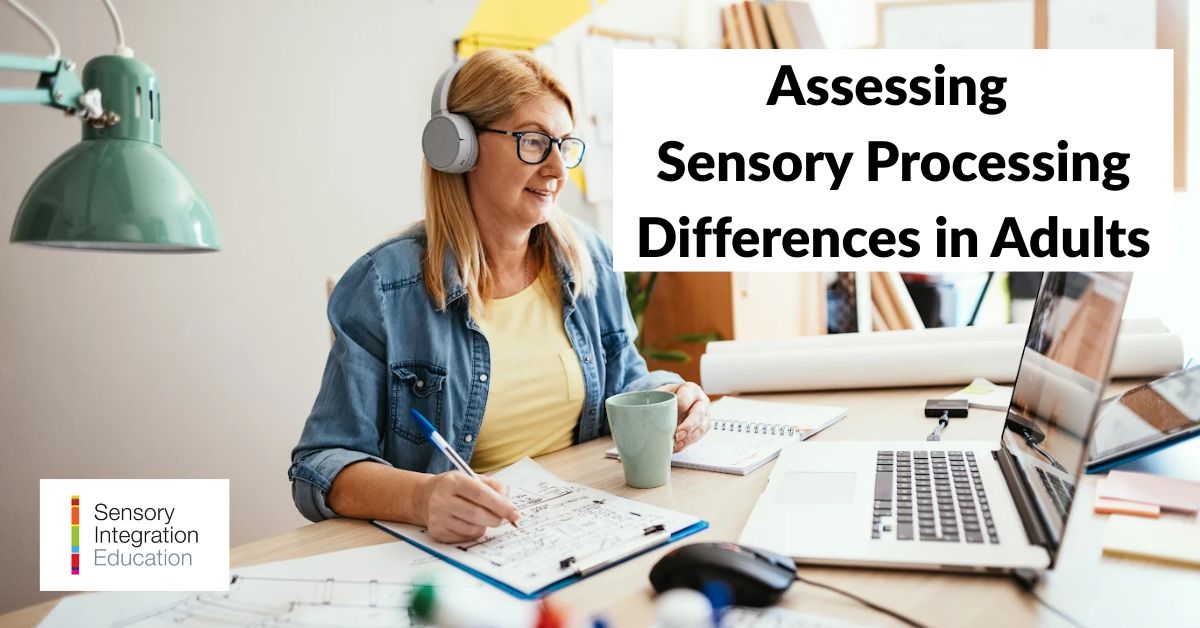
In this blog we discuss the importance of recognising and assessing sensory integration differences in adults and key evidence-based Sensory Integration assessment tools available for the adult population. These tools help to provide a comprehensive understanding of an individual’s sensory profile, enabling tailored strategies and supports that enhance self-regulation, participation, and overall quality of life.
Managing Sensory Processing Differences as an Adult
This is a throwback to a blog published last year where Dr Lelanie Brewer explores practical ways to manage the daily challenges adults with sensory processing differences can face—from household tasks to parenting and leisure activities.
The blog highlights the importance of making personal choices that support comfort and wellbeing, as well as reminding adults to pace themselves and allow time to recover from sensory overload.
Also see:
Southend Council launches UK's first high street sensory pod
After 40 years as an autistic person in the workplace, I realised it was OK to ask for changes
Autism group's store aims to open up work chances
City of York launches all-age strategy to support autistic people and those with ADHD
Resources
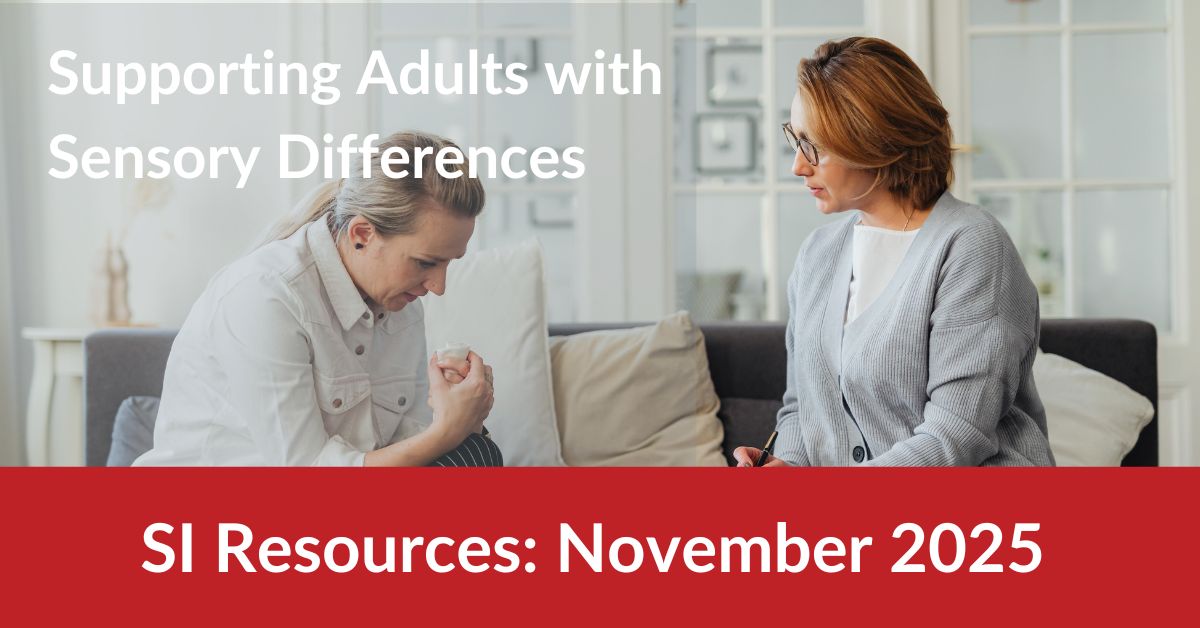
Take a look at our books and product recommendations for this month:
An Occupational Therapist’s Guide to Sensory Integration and Adult Mental Health: Written by SIE graduate and Advanced SI Practitioner Rebecca Matson, this book provides a reference manual for occupational therapists working in mental health and aiming to use a range of sensory approaches with adult patients. Structured according to diagnostic group and area of mental health, each chapter distils the relevant evidence and literature, commonly identified areas of sensory processing difficulty, ideas and approaches for that client group, and additional considerations in view of risk and health status.
Embracing Late Adult Autism: A Self-Help Guide for Adults Discovering Their Neurodivergent Mind and Learning to Thrive on the Spectrum: While most autism resources focus on children, this book shines a much-needed light on adult experiences. Written by Susanna Kingston, a late-diagnosed autistic advocate herself, this guide offers up personal anecdotes alongside expert knowledge and practical tools. Susanna helps to demystify the late adult autism experience, offering readers validation, clarity, and actionable strategies for living authentically.
Interoception and Regulation: Teaching Skills of Body Awareness and Supporting Connection with Others: This practical and informative book demystifies interoception and provides tools to help boost interoceptive abilities. It summarises the latest research, explores how interoceptive difficulties can be identified, suggests strategies to manage feelings and emotions, and explains how to support individuals in 'tuning in' to themselves.
Sensory Cuddle Ball: This Sensory Cuddle Ball provides a comforting tactile experience with a design that allows hands and fingers to explore the ridges and gaps in the ball. By sliding your fingers or hands into the gaps, you will feel some calming deep pressure and the gaps allow hands and arms to be placed inside providing extra comfort and warmth.
Fidget Roller Keychain Stimming Toy: This spiky fidget keychain is compact and lightweight, meaning it can fit easily into a pocket or bag. Rolling or squeezing the hard spiky massage surface helps you to relax and improve focus with satisfying tactile feedback. Its noiseless design makes it perfect for classrooms, offices or public spaces.
SI Research Digest
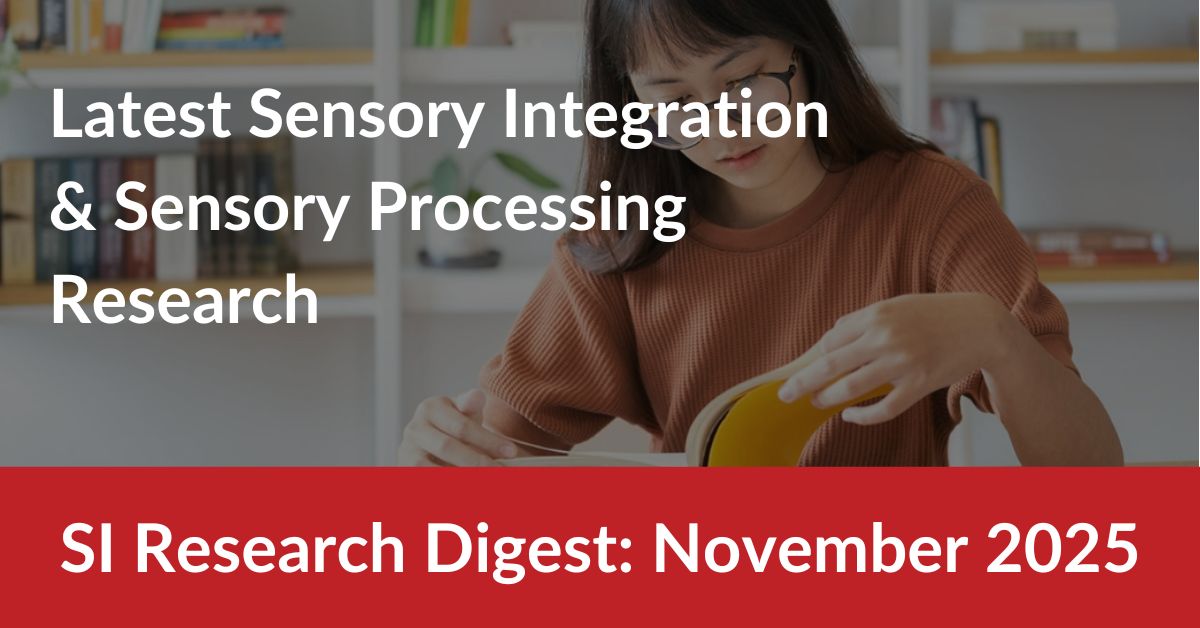
Below are links to the most popular sensory integration and sensory processing research papers and findings published on our social channels last month:
This new systematic review consisting of 31 studies investigated sensory processing patterns in individuals with ADHD. The researchers found that individuals with ADHD showed a significantly higher prevalence of sensory differences across all four domains of the Sensory Profile assessment compared to those without ADHD.
Co-occurrence of ADHD and Motor Problems in Children: The Impact on Quality of Life
This new study investigated quality of life (QoL) in children with ADHD, DCD and co-occurring ADHD and DCD. The researchers found that both motor impairments and ADHD can significantly impact on the quality of life for children and young people.
This recent study investigated sensory processing differences in children age 6-8 years with and without ADHD. The researchers found that children with ADHD presented with significant sensory differences impacting participation in school in comparison to their peers with a higher prevalence of bilateral coordination difficulties amongst female study participants. In this study, male study participants in contrast demonstrated more difficulties with balance.
Misophonia in Autism: A Systematic Review of Prevalence, Clinical Features, and Comorbidities
This recent systematic review highlights the high prevalence of misophonia, an extreme emotional reaction to certain everyday sounds that most people would find relatively easy to ignore in autistic individuals. The authors recommend that future research should focus on intervention strategies to support individuals with misophonia.
Upcoming Courses and Webinars
We have a number of live webinars that take place throughout the year covering a broad range of SI-related topics. Below is a snapshot of webinars happening over the next few months or click here to view a summary of all the upcoming live events.
All these webinars are available to you by signing up to our Lifelong Learning Programme or can be purchased as individual courses:
ØThe Sensory Side of Parenting - 18 November 2025
Ø(Sensory Spotlight Talk) Psycho-Sensory Intervention- 8 January 2026
Ø Embodied Reasoning for Paediatric Occupational Therapists – 6 Feb 2026
Ø Sensory Integration and Burnout in ADHD – 18 Feb 2026
Latest Job Listings
 Are you thinking of making a career move this year? Check out our latest job listing:
Are you thinking of making a career move this year? Check out our latest job listing:
Contractors – Paediatric Occupational Therapists with Sensory Integration Training, Parents And Children Together (PACT), Berkshire and surrounding areas, UK
Discounts & Special Offers
 From 15 December – 14 January, we will be running our LLP Winter Webinar Replay Offer! SIE Lifelong Learning members will have the opportunity to watch replays of our most popular webinars from earlier in the year. Details to follow shortly on our socials!
From 15 December – 14 January, we will be running our LLP Winter Webinar Replay Offer! SIE Lifelong Learning members will have the opportunity to watch replays of our most popular webinars from earlier in the year. Details to follow shortly on our socials!
Please quote DISCOUNT CODE SIE20 for 10% discount on Southpaw orders up to £100. Orders must be placed by phone on +44 (0) 115 718 0020.
Would you like to receive EmphaSIze: The Sensory Integration Newsletter in your inbox? JOIN SIE FREE TODAY
Best wishes,
Sensory Integration Education
NB: Sensory Integration Education is not responsible for the content on external websites. Sharing a resource does not imply endorsement by Sensory Integration Education.


